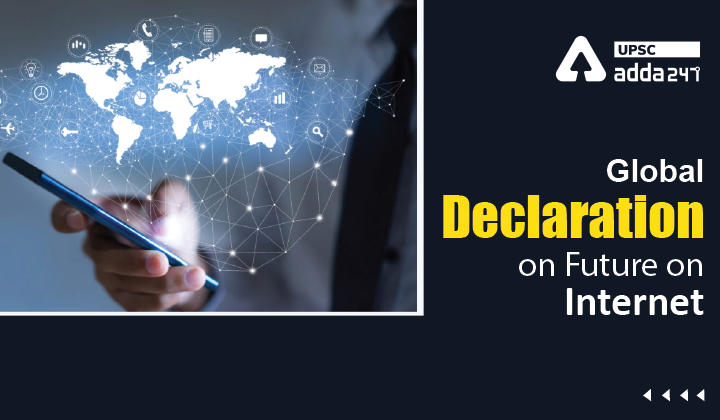Table of Contents
Declaration on future of internet UPSC: Relevance
- GS 3: Awareness in the fields of IT, Space, Computers.
Global Declaration on Future of Internet: Context
- Recently, several international partners have proposed a Declaration for the Future of the Internet, to set out the vision and principles of a trusted Internet, and to prevent digital authoritarianism.
Global Declaration on Future on Internet: Key points
- The international partners countries that have signed the declaration include the US, European Union, United Kingdom, Canada and France among the signatories.
- The declaration represents a political commitment among the partner countries to advance a positive vision for the internet and digital technologies.
- India, China and Russia are among the large nations that have not signed the declaration.
- The partners in the declaration affirm that the Internet must reinforce core democratic principles, fundamental freedoms and human rights as reflected in the Universal Declaration of Human Rights.
- The Declaration is of political nature. Adhering to the principles contained in the Declaration does not create legally binding effects for its signatories.
Global Declaration on Future on Internet: Why needed?
- Rising digital authoritarianism where some states act to repress freedom of expression, censor independent news sites, interfere with elections, promote disinformation, and deny their citizens other human rights.
- Millions of people still face barriers to access and cybersecurity risks and threats undermine the trust and reliability of networks.
- The current situation in Ukraine dramatically demonstrates the risk of severe disruption of the Internet, notably in the form of total or partial shutdowns.
About the Global Declaration on Future on Internet: Key proposals
- The Declaration’s principles include
- commitments to protecting human rights and fundamental freedoms of all people,
- promote a global Internet that advances the free flow of information,
- advancing “inclusive and affordable” connectivity,
- promote trust in the global digital ecosystem, including through protection of privacy and protecting and strengthening the multistakeholder approach to governance.
- Internet should be decentralised and globally interconnected.
Internet shutdown in India and the world
- A total of 182 internet crackdowns were reported globally in 2021.
- Out of 106 shutdowns in India, 85 were reported in Jammu and Kashmir.
- India was one of among 18 countries that blocked mobile internet during protests.
- The number of countries that shut down the internet in 2021 has increased to 34 from 29 in 2020.
Read current affairs for UPSC





 TSPSC Group 1 Question Paper 2024, Downl...
TSPSC Group 1 Question Paper 2024, Downl...
 TSPSC Group 1 Answer key 2024 Out, Downl...
TSPSC Group 1 Answer key 2024 Out, Downl...
 UPSC Prelims 2024 Question Paper, Downlo...
UPSC Prelims 2024 Question Paper, Downlo...




